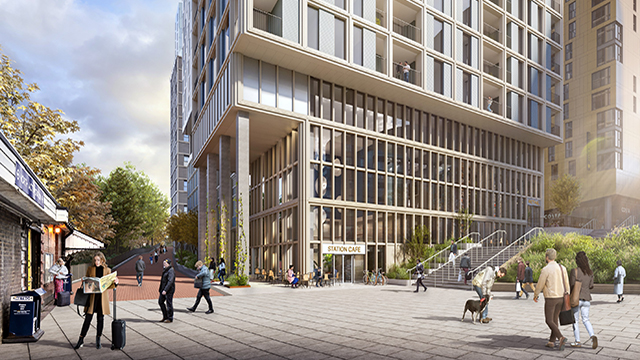Town and country planning – Planning policy – Airport – Appellant companies applying for judicial review of respondent secretary of state’s Airports National Policy Statement designating third runway at Heathrow as preferred scheme for meeting need for increased airport capacity in South East England – Appellants proposing extension of northern runway – Divisional court dismissing application – Appellants appealing – Whether decision of respondent was lawful – Appeal dismissed
In 2018, the respondent secretary of state made a decision under section 5 of the Planning Act 2008 to designate the “Airports National Policy Statement: new runway capacity and infrastructure at airports in the South East of England” (ANPS). The ANPS concluded that airport capacity in the South East of England should be increased and that increase should be provided by constructing a third runway at Heathrow Airport to the north west of the current runways (the NWR Scheme).
The appellant companies, which supported the expansion of Heathrow, had promoted an alternative scheme, to which they owned the intellectual property rights, which involved an expansion of capacity at Heathrow by way of an extension of the current northern runway so that it could effectively operate as two separate runways (the Extended Northern Runway (ENR) Scheme).
The first interested party was the owner and current operator of Heathrow. It had promoted the NWR Scheme. The second interested party owned a significant portion of the land within the geographic boundary of the NWR Scheme and supported the expansion of Heathrow by way of the NWR Scheme; it proposed a distinct terminal which it would develop and operate.
In 2012, the government established the Airports Commission to evaluate and report on how any need for additional capacity should be met in the short, medium and long term. At a meeting in 2016, the respondent requested the first appellant to obtain a written assurance from the first interested party that if the ENR scheme was selected, the first interested party would agree to implement it. However, that assurance was never formally given.
The appellants applied for judicial review of the respondent’s decision to prefer the NWR scheme over the ENR scheme and to designate the ANPS accordingly. The Divisional Court dismissed the application: [2019] EWHC 1069 (Admin); [2019] PLSCS 81. The appellants appealed.
Held: The appeal was dismissed
(1) Contrary to the appellants’ submission, the respondent’s request that the appellants obtain an assurance from the first interested party to implement their extended northern runway scheme did not amounted to a breach of a “legitimate expectation” that the respondent would not take into account any risks arising from the fact that the appellant depended upon the first interested party to deliver its extended northern runway scheme in making the decision to prefer the north-west runway scheme. What was required was that there had to be a practice (even though there was no express promise) which was impliedly tantamount to such a promise. That practice still had to give rise to a representation which was clear, unambiguous and devoid of any relevant qualification. There was no express or implied promise or any regular pattern of behaviour amounting to a representation that that would never be a consideration in the preference decision process, still less a clear and unambiguous representation devoid of any relevant qualification such as to justify a finding in law of legitimate expectation.
(2) The fact that the respondent had a supervisory role in relation to the Airports Commission, setting its terms of reference and requiring the production of the Airports Commission Report, did not, and could not, begin to amount to an express or implied representation by the respondent that only scheme-specific risks would be taken into account in the future when making the preference decision. The Airports Commission Report was not part of any procurement process. The Airports Commission’s function was to look at possible technical solutions for the aviation capacity problem in the South of England. There was nothing in the Airports Commission’s terms of reference to suggest that the respondent required the Airports Commission to consider promoter-specific issues. That did not mean that promoter-specific issues would not become relevant; plainly, at some stage they were bound to come into focus.
On the evidence, the Divisional Court had been entitled to find that the absence of an assurance was immaterial to the preference and designation decisions. The legal question was whether the “promoter-specific” factor of the absence of an assurance could potentially be taken into account as a matter of law. The factual question was whether or not the “promoter-specific” factor was in fact material to the decision to designate the ANPS and taken into account. The absence of an assurance was potentially a relevant factor which could have been taken into account. However, in fact, the absence of an assurance turned out not to be material to the final decision to prefer the NWR scheme and designate the ANPS. Accordingly, the Divisional Court had been right to reject the appellants’ challenges as unsustainable and to uphold the ANPS as lawful and rational.
(3) The Divisional Court held that, even if the first interested party had responded positively to the request for an assurance, it would have made no difference to the outcome, because it could not have improved the objective merits of the ENR scheme. Therefore, it was highly likely that the designation decision would been the same whether or not an assurance had been requested or forthcoming, and accordingly, under section 31(2A) of the Senior Courts Act 1981, the court would have been bound to dismiss the claim for judicial review in any event.
Martin Kingston QC, Robert O’Donoghue QC, Satnam Choongh and Emma Mockford (instructed by DAC Beachcroft LLP) appeared for the appellant; Robert Palmer QC, Alan Bates, Richard Moules and Andrew Byass (instructed by the Government Legal Department) appeared for the respondent; Michael Humphries QC, Gerry Facenna QC and Richard Turney (instructed by Bryan Cave Leighton Paisner LLP) appeared for the first interested party; Charles Banner QC (instructed by CMS Cameron McKenna Nabarro Olswang LLP) appeared for the second interested party; Sarah Hannett (instructed by Office of the Speaker’s Counsel in the House of Commons) appeared for the intervener.
Eileen O’Grady, barrister








